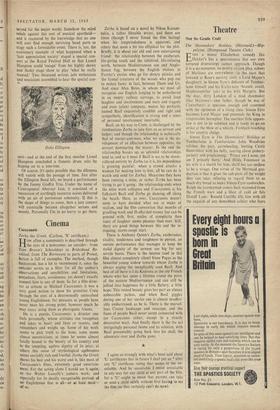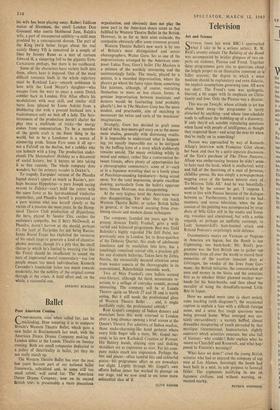Theatre
Not So Gentle Craft
EVEN a minor Elizabethan comedy like Dekker's has a spaciousness that our own tortured dramaturgy cannot approach. Though it is a no-nonsense, no-poetry citizen play, echoes of Marlowe are everywhere-- in the stars that lowered at Rose's nativity (only a Lord Mayor's daughter); in Simon Eyre's defiance of Tambur- laine himself and his Ercles-vein 'Avaunt, avoid, Mephistophilus' (sic) to his wife Margery. But the dear, dirty London of a mad shoemaker (like Marlowe's own father, though he was of Canterbury) is spacious enough and crammed with the optimism of a rising class. Simon Eyre becomes Lord Mayor and pummels the King in irrepressible horseplay. The snottiest little appren- tice is not to be subdued and is ready to go on strike at the blow of a whistle. Forblock-touching is for country cledge.
Simon Eyre is The Shoemakers' Holiday as Tamburlaine is Tamburlaine. John Woodvine relishes the part, cartwheeling, butting Cicely Bumtrinket with his belly, roaring about pishery- pashery and proclaiming: 'Prince am I none, yet am I princely born.' And Hilda Fenemore as his wife is a match for him, shrill but too mellow to be a virago. One virtue of the Mermaid pro- duction is that it gives the sub-plots all the weight they can take, refusing to regard them as so much dry bread to make Simon-Eyre-sandwiches. Ralph the journeyman comes back wounded from the French wars and a blast of cold air hits Distaff Lane: Ronald Cunliffe fills him with all the anguish of any demobbed soldier who fears
his wife has been playing away. Robert Eddison makes of Hammon, the small London Don Giovanni who courts blubbered Jane, Ralph's wife, a part of unsuspected subtlety—a mild man prodded by a concupiscent demon. The part of the King (we'd better forget about the real saintly Henry VI) is conceived in a couple of lines by Jeremy Rowe as a sort of cartoon Edward II, a simpering foil to the gigantic Eyre. Caricatures perhaps, but there is no cardboard.
Some of the characters have variety built into them, others have it imposed. One of the most difficult romantic leads in the whole refiertory must be Rowland Lacy—smooth nobleman in love with the Lord Mayor's daughter—who escapes from the wars to enact a comic Dutch cobbler back in London. Eric Allan effects his modulations with easy skill, and similar skill turns Jane (played by Liane Aukin) from a blubbering slut with a pressed husband into a tradeswoman only an inch off a lady. The bois- terousness of the production doesn't shatter the play into a multitude of tricks—the energy comes from concentration. To be a member of the gentle craft is the finest thing in the world, but to be a Londoner is a source of simmering pride. Simon Eyre sums it all up— not a Falstaff on the decline, but a cobbler who can hobnob with a king. The production under- stands The Shoemakers' Holiday as a document of social history, but it batters us into taking it as tine comedy. The whole company does wonders, but the primary wonder is Dekker's.
To tragedy. Euripides' version of the Phaedra legend doesn't appeal as much as Racine's, per- haps because Hippolytus—a pure Joseph saying avaunt to Zuleika—can't hold the centre with the same force as his lust-maddened vindictive stepmother, and Phaedra herself is presented as a pure woman who sees herself clearly as the victim of a passion she must resist. In the Hamp- stead Theatre Club production of Hippolytus, the hero, played by Sandor Elcs, catches the audience's sympathy, but if Betty McDowell, as Phaedra, doesn't harrow as she should, perhaps it's the fault of Euripides for not being Racine. James Roose Evans has exploited the resources of his small stage to generate a kind of claustro- phobic neurosis, though it's a pity that the small chorus to which he's limited (a weaving trio like the Fates) should be insufficient to sound the note of impersonal moral commentary—too few people means too much individuation. Kenneth Cavander's translation itches too much towards modernity, but the nobility of the original comes through at the crises. A bold effort and, on the whole, a successful one.
ANTHONY BURGESS



































 Previous page
Previous page